- Home
- Toni Morrison
A Mercy Page 12
A Mercy Read online
Page 12
Seeing him still and limp on the floor with that trickle of red from his mouth your face breaks down. You knock me away shouting what are you doing? shouting where is your ruth? With such tenderness you lift him, the boy. When you see the angle of his arm you cry out. The boy opens his eyes then faints once more when you twist it back into its proper place. Yes, there is blood. A little. But you are not there when it comes, so how do you know I am the reason? Why do you knock me away without certainty of what is true? You see the boy down and believe bad about me without question. You are correct but why no question of it? I am first to get the knocking away. The back of your hand strikes my face. I fall and curl up on the floor. Tight. No question. You choose the boy. You call his name first. You take him to lie down with the doll and return to me your broken face, eyes without glee, rope pumps in your neck. I am lost. No word of sorrow for knocking me off my feet. No tender fingers to touch where you hurt me. I cower. I hold down the feathers lifting.
Your Mistress recovers you say. You say you will hire someone to take me to her. Away from you. Each word that follows cuts.
Why are you killing me I ask you.
I want you to go.
Let me explain.
No. Now.
Why? Why?
Because you are a slave.
What?
You heard me.
Sir makes me that.
I don’t mean him.
Then who?
You.
What is your meaning? I am a slave because Sir trades for me.
No. You have become one.
How?
Your head is empty and your body is wild.
I am adoring you.
And a slave to that too.
You alone own me.
Own yourself, woman, and leave us be. You could have killed this child.
No. Wait. You put me in misery.
You are nothing but wilderness. No constraint. No mind.
You shout the word—mind, mind, mind—over and over and then you laugh, saying as I live and breathe, a slave by choice.
On my knees I reach for you. Crawl to you. You step back saying get away from me.
I have shock. Are you meaning I am nothing to you? That I have no consequence in your world? My face absent in blue water you find only to crush it? Now I am living the dying inside. No. Not again. Not ever. Feathers lifting, I unfold. The claws scratch and scratch until the hammer is in my hand.
Jacob Vaark climbed out of his grave to visit his beautiful house.
“As well he should,” said Willard.
“I sure would,” answered Scully.
It was still the grandest house in the whole region and why not spend eternity there? When they first noticed the shadow, Scully, not sure it was truly Vaark, thought they should creep closer. Willard, on the other hand, knowledgeable about spirits, warned him of the consequences of disturbing the risen dead. Night after night they watched, until they convinced themselves that no one other than Jacob Vaark would spend haunting time there: it had no previous tenants and the Mistress forbade anyone to enter. Both men respected, if they did not understand, her reasoning.
For years the neighboring farm population made up the closest either man would know of family. A goodhearted couple (parents), and three female servants (sisters, say) and them helpful sons. Each member dependent on them, none cruel, all kind. Especially the master who, unlike their more-or-less absent owner, never cursed or threatened them. He even gave them gifts of rum during Christmastide and once he and Willard shared a tipple straight from the bottle. His death had saddened them enough to disobey their owner’s command to avoid the poxed place; they volunteered to dig the last, if not the final, grave his widow would need. In dousing rain they removed five feet of mud and hurried to get the body down before the hole filled with water. Now, thirteen days later, the dead man had left it, escaped his own grave. Very like the way he used to reappear following weeks of traveling. They did not see him—his definitive shape or face—but they did see his ghostly blaze. His glow began near midnight, floated for a while on the second story, disappeared, then moved ever so slowly from window to window. With Master Vaark content to roam his house and not appear anywhere else, scaring or rattling anybody, Willard felt it safe and appropriate for him and Scully to stay loyal and help the Mistress repair the farm; prepare it also, for nothing much had been tended to after she fell ill. June on its way and not a furrow plowed. The shillings she offered was the first money they had ever been paid, raising their work from duty to dedication, from pity to profit.
There was much to be done because, hardy as the women had always been, they seemed distracted, slower, now. Before and after the blacksmith healed Mistress and the girl, Florens, was back where she belonged, a pall had descended. Still, Willard said, Lina continued to do her work carefully, calmly, but Scully disagreed, said she was simmering. Like green apples trembling in boiling water too long, the skin near to breaking, needing quick removal, cooling before mashed into sauce. And Scully should know since he had wasted hours over the years secretly watching her river baths. Unfettered glimpses of her buttocks, that waist, those syrup-colored breasts, were no longer available. Mainly he missed what he never saw elsewhere: uncovered female hair, aggressive, seductive, black as witchcraft. Seeing its wet cling and sway on her back was a quiet joy. Now, no more. Wherever, if ever, she bathed he was convinced she was about to burst.
Mistress had changed as well. The mourning, said Willard, the illness—the effects of all of that were plain as daylight. Her hair, the brassy strands that once refused her cap, had become pale strings drifting at her temples, adding melancholy to her newly stern features. Rising from her sickbed, she had taken control, in a manner of speaking, but avoided as too tiring tasks she used to undertake with gusto. She laundered nothing, planted nothing, weeded never. She cooked and mended. Otherwise her time was spent reading a Bible or entertaining one or two people from the village.
“She’ll marry again, I reckon,” said Willard. “Soon.”
“Why soon?”
“She’s a woman. How else keep the farm?”
“Who to?”
Willard closed one eye. “The village will provide.” He coughed up a laugh recalling the friendliness of the deacon.
Sorrow’s change alone seemed to them an improvement; she was less addle-headed, more capable of handling chores. But her baby came first and she would postpone egg-gathering, delay milking, interrupt any field chore if she heard a whimper from the infant always somewhere nearby. Having helped with her delivery, they assumed godfather status, even offering to mind the baby if Sorrow needed them to. She declined, not because she did not trust them; she did, but out of a need to trust herself.
Strangest was Florens. The docile creature they knew had turned feral. When they saw her stomping down the road two days after the smithy had visited Mistress’ sickbed and gone, they were slow to recognize her as a living person. First because she was so blood-spattered and bedraggled and, second, because she passed right by them. Surely a sudden burst of sweating men out of roadside trees would have startled a human, any human, especially a female. But this one neither glanced their way nor altered her pace. Both men, breathless and still spooked from a narrow escape, leaped out of her path. In their frightened minds anything could be anything. Both were running as fast as they could back to the livestock under their care before the hogs ate their litter. Much of the morning they had spent hiding from an insulted bear, a harrowing incident they agreed was primarily Willard’s fault. The netted partridge hanging from the older man’s waist was supplement enough for two meals each. It was reckless to press their good fortune and linger just so he could rest beneath a beech and puff his pipe. Both knew what a whiff of smoke could do in woods where odor was decisive: to flee, attack, hide or, as in the case of a sow bear, investigate. When the laurel hell that had yielded the partridges suddenly crackled, Willard stood up, holding his hand out to Scully for silence. S
cully touched his knife and stood also. After a moment of uncanny quiet—no birdcalls or squirrel chatter—the smell washed over them at the same moment the sow crashed through the laurel clicking her teeth. Not knowing which of them she would select, they separated, each running man hoping he had made the correct choice, since play possum was not an option. Willard ducked behind an outcropping, thumb tamped his pipe and prayed the ledge of slate would disable the wind’s direction. Scully, certain he felt hot breath on his nape, leaped for the lowest branch and swung up onto it. Unwise. Herself a tree climber, the bear had merely to stand up to clamp his foot in her jaws. Scully’s fear was not craven, however, so he determined to make at least one powerful gesture of defense no matter how hopeless. He snatched out his knife, turned and, without even aiming, rammed it at the head of the agile black hulk below. For once desperation was a gift. The blade hit, slid like a needle into the bear’s eye. The roar was terrible as, clawing bark, she tumbled to the ground on her haunches. A ring of baying dogs could not have enraged her more. Snarling, standing straight up, she slapped at the stuck blade until it fell out. Then down on all fours she rolled her shoulders and wagged her head from side to side. It seemed to Scully a very long time before the grunt of a cub got her attention and, off balance by the blinding that diminished her naturally poor sight, she lumbered away to locate her young. Scully and Willard waited, one treed like a caught bear himself, the other hugging rock, both afraid she would return. Convinced finally that she would not, cautiously sniffing for the smell of fur, listening for a grunt, the movement of the other, or a return of birdcall, they emerged. Slowly, slowly. Then raced. It was when they shot from the wood onto the road that they saw the female-looking shape marching toward them. Later, when they discussed it, Scully decided she looked less like a visitation than a wounded redcoat, barefoot, bloody but proud.
Sold for seven years to a Virginia planter, young Willard Bond expected to be freed at age twenty-one. But three years were added onto his term for infractions—theft and assault—and he was re-leased to a wheat farmer far up north. Following two harvests, the wheat succumbed to blast and the owner turned his property over to mixed livestock. Eventually, as overgrazing demanded more and more pasture, the owner made a land-for-toil trade with his neighbor, Jacob Vaark. Still, one man could not handle all that stock. The addition of a boy helped.
Before Scully’s arrival, Willard had suffered hard and lonesome days watching cattle munch and mate, his only solace in remembering harder but more satisfying days in Virginia. Brutal though that work was, the days were not flat and he had company. There he was one of twenty-three men working tobacco fields. Six English, one native, twelve from Africa by way of Barbados. No women anywhere. The camaraderie among them was sealed by their shared hatred of the overseer and the master’s odious son. It was upon the latter that the assault was made. Theft of a shoat was invented and thrown in just to increase Willard’s indebtedness. He had trouble getting used to the rougher, colder region he was moved into. At night in his hammock, trapped in wide, animated darkness, he braced himself against the living and the dead. The glittering eyes of an elk could easily be a demon, just as the howls of tortured souls might be the call of happy wolves. The dread of those solitary nights gripped his days. Swine, sheep and cattle were his sole companions, until the owner returned and carted away the best for slaughter. Scully’s arrival was met with welcome and relief. And when their duties expanded to occasional help on the Vaark place, and they developed an easy relationship with its people, there were just a few times Willard overdrank and misbehaved. Early on in his post, he had run away twice, only to be caught in a tavern yard and given a further extension of his term.
An even greater improvement in his social life began when Vaark decided to build a great house. Again, he was part of a crew of laborers, skilled and not, and when the blacksmith came, things got more and more interesting. Not only was the house grand and its enclosure impressive, its gate was spectacular. Sir wanted fancy work on both panels, but the smithy persuaded him no. The result was three-foot-high lines of vertical bars capped with a simple pyramid shape. Neatly these iron bars led to the gate each side of which was crowned by a flourish of thick vines. Or so he thought. Looking more closely he saw the gilded vines were actually serpents, scales and all, but ending not in fangs but flowers. When the gate was opened, each one separated its petals from the other. When closed, the blossoms merged.
He admired the smith and his craft. A view that lasted until the day he saw money pass from Vaark’s hand to the blacksmith’s. The clink of silver was as unmistakable as its gleam. He knew Vaark was getting rich from rum investments, but learning the blacksmith was being paid for his work, like the men who delivered building materials, unlike the men he worked with in Virginia, roiled Willard, and he, encouraging Scully, refused any request the black man made. Refused to chop chestnut, haul charcoal or work bellows and “forgot” to shield green lumber from rain. Vaark chastised them both into sullen accommodation, but it was the smithy himself who calmed Willard down. Willard had two shirts, one with a collar, the other more of a rag. On the morning he slipped in fresh dung and split the shirt all the way down its back, he changed into the good collared one. Arriving at the site, he caught the blacksmith’s eye, then his nod, then his thumb pointing straight up as if to signal approval. Willard never knew whether he was being made fun of or complimented. But when the smithy said, “Mr. Bond. Good morning,” it tickled him. Virginia bailiffs, constables, small children, preachers—none had ever considered calling him mister, nor did he expect them to. He knew his rank, but did not know the lift that small courtesy allowed him. Joke or not, that first time was not the last because the smithy never failed to address him so. Although he was still rankled by the status of a free African versus himself, there was nothing he could do about it. No law existed to defend indentured labor against them. Yet the smithy had charm and he did so enjoy being called mister. Chuckling to himself, Willard understood why the girl, Florens, was struck silly by the man. He probably called her miss or lady when they met in the wood for suppertime foolery. That would excite her, he thought, if she needed any more than just the black man’s grin.
“In all my born days,” he told Scully, “I never saw anything like it. He takes her when and where he wants and she hunts him like a she-wolf if he’s not in her eye. If he’s off at his bloomery for a day or two, she sulks till he comes back hauling the blooms of ore. Makes Sorrow look like a Quaker.”
Only a few years older than Florens, Scully was less bewildered by the sharp change in her demeanor than Willard was. He thought of himself as an astute judge of character, felt he, unlike Willard, had a wily, sureshot instinct for the true core of others. Willard judged people from their outside: Scully looked deeper. Although he relished Lina’s nakedness, he saw a purity in her. Her loyalty, he believed, was not submission to Mistress or Florens; it was a sign of her own self-worth—a sort of keeping one’s word. Honor, perhaps. And while he joined Willard in making fun of Sorrow, Scully preferred her over the other two servants. If he had been interested in seduction, that’s who he would have chosen: the look of her was daunting, complicated, distant. The unblinking eyes, smoke gray, were not blank, but waiting. It was that lying-in-wait look that troubled Lina. Everyone but himself thought she was daft because she talked out loud when alone, but who didn’t? Willard issued greetings to ewes regularly and Mistress always chatted directions to herself while at some solitary task. And Lina—she answered birds as if they were asking her advice on how to fly. To dismiss Sorrow as “the odd one” ignored her quick and knowing sense of her position. Her privacy protected her; her easy coupling a present to herself. When pregnant, she glowed and when her time came she sought help in exactly the right place from the right people.
On the other hand, if he had been interested in rape, Florens would have been his prey. It was easy to spot that combination of defenselessness, eagerness to please and, most of all, a willingne
ss to blame herself for the meanness of others. Clearly, from the look of her now, that was no longer true. The instant he saw her marching down the road—whether ghost or soldier—he knew she had become untouchable. His assessment of her un-rape-ability, however, was impersonal. Other than a voyeur’s obsession with Lina’s body, Scully had no carnal interest in females. Long ago the world of men and only men had stamped him and from the first moment he saw him he never had any doubt what effect the blacksmith would have on Florens. Thus her change from “have me always” to “don’t touch me ever” seemed to him as predictable as it was marked.
Also Scully’s opinion of Mistress was less generous than Willard’s. He did not dislike her but looked on her behavior after the master’s death and her own recovery not simply as the effects of ill health and mourning. Mistress passed her days with the joy of a clock. She was a penitent, pure and simple. Which to him meant that underneath her piety was something cold if not cruel. Refusing to enter the grand house, the one in whose construction she had delighted, seemed to him a punishment not only of herself but of everyone, her dead husband in particular. What both husband and wife had enjoyed, even celebrated, she now despised as signs of both the third and seventh sins. However well she loved the man in life, his leaving her behind blasted her. How could she not look for some way to wreak a bit of vengeance, show him how bad she felt and how angry?
In his twenty-two years, Scully had witnessed far more human folly than Willard. By the time he was twelve he had been schooled, loved and betrayed by an Anglican curate. He had been leased to the Synod by his so-called father following his mother’s death on the floor of the tavern she worked in. The barkeep claimed three years of Scully’s labor to work off her indebtedness, but the “father” appeared, paid the balance due and sold his son’s services, along with two casks of Spanish wine, to the Synod.
Scully never blamed the curate for betrayal nor for the flogging that followed, since the curate had to turn the circumstances of their being caught into the boy’s lasciviousness, otherwise he would be not just defrocked but executed. Agreeing that Scully was too young to be permanently incorrigible, the elders passed him along to a landowner who needed a hand to work with a herdsman far away. A rural area, barely populated, where, they hoped, the boy might at best mend his ways or at worst have no opportunity to corrupt others. Scully anticipated running away as soon as he arrived in the region. But on the third day a violent winter storm froze and covered the land in three feet of snow. Cows died standing. Ice-coated starlings clung to branches drooping with snow. Willard and he slept in the barn among the sheep and cattle housed there, leaving the ones they could not rescue on their own. There in the warmth of animals, their own bodies clinging together, Scully altered his plans and Willard didn’t mind at all. Although the older man liked drink, Scully, having slept beneath the bar of a tavern his whole childhood and seen its effects on his mother, avoided it. He decided to bide his time until, given the freedom fee, he was able to buy a horse. The carriage or cart or wagon drawn were not superior to the horse mounted. Anyone limited to walking everywhere never seemed to get anywhere.

 Paradise
Paradise Beloved
Beloved Home
Home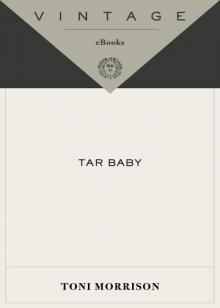 Tar Baby
Tar Baby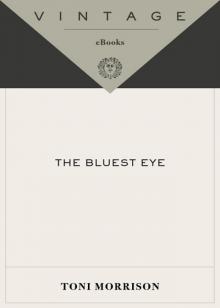 The Bluest Eye
The Bluest Eye Jazz
Jazz Love
Love Sula
Sula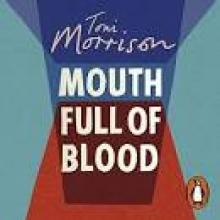 Mouth Full of Blood
Mouth Full of Blood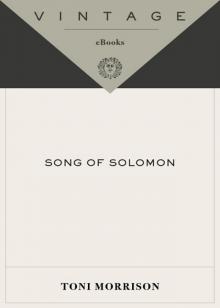 Song of Solomon
Song of Solomon The Source of Self-Regard
The Source of Self-Regard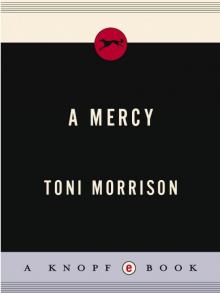 A Mercy
A Mercy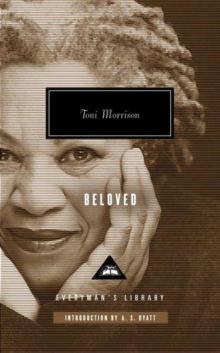 Beloved_a novel
Beloved_a novel